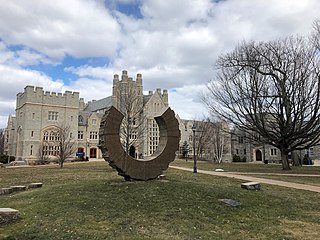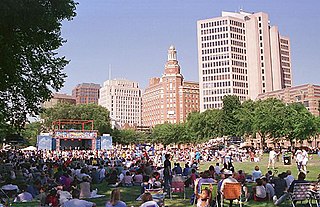
The Clinton School of Public Service is a branch of the University of Arkansas system and is the newest of the presidential schools. It is located on the grounds of the Clinton Presidential Center in Little Rock. The school is housed in the Choctaw Route Station, a former Chicago, Rock Island and Pacific Railroad station built in 1899.

Thomas Joseph Dodd was an American attorney and diplomat who served as a United States Senator and Representative from Connecticut, He is the father of former U.S. Senator Christopher Dodd and Thomas J. Dodd, Jr., who served as the United States Ambassador to Uruguay from 1993 to 1997 and to Costa Rica from 1997 to 2001.

Manchester Community College (MCC) is a public community college in Manchester, Connecticut. Founded in 1963, it is the third-oldest of the twelve community colleges governed by the Connecticut State Colleges & Universities system (CSCU) and has graduated more than 23,000 students since the first class in 1965.

The University of Connecticut School of Law is a public law school associated with the University of Connecticut and located in Hartford, Connecticut. It is the only public law school in Connecticut and one of only four in New England. The school was ranked 58th overall in the 2022 Best Law Schools ranking by U.S. News & World Report, making it the highest ranked public law school in the Northeast. The law school has 488 JD students and a student:faculty ratio of 5:1.
Drake University Law School is the professional graduate law school of Drake University, located in Des Moines, Iowa. The school has over 330 full-time students. The school is led by Dean Jerry Anderson. Founded in 1865, Drake Law School is one of the 25 oldest law schools in the country. The Law School was established by Iowa Supreme Court justices George Wright and Chester Cole, who aimed to teach law in proximity to the courts so students could witness the law in action. Drake Law School's curriculum includes the nation's only First-Year Trial Practicum. In 2020, the American Bar Association ranked Drake the 7th best competition school in the nation. In 2020, the U.S. News and World Report ranked Drake Law School as the 105th best overall law school in the nation.
The Ateneo de Manila University School of Law is the law school of the Ateneo de Manila University, a private Jesuit university in the Philippines. It was founded in 1936, at Padre Faura St., Ermita, Manila campus of the Ateneo, where it remained even after the college, graduate school, and basic education units moved to Loyola Heights, Quezon City in the 1950s. In 1977, it moved to Salcedo Village in Makati, and in 1998, transferred to its present location in Makati's Rockwell Center.Its current dean is alumnus Jose G. Hofileña who succeeded Sedfrey Candelaria who, in turn, succeeded Cesar L. Villanueva. Its patron saint is Thomas More.

The American University Washington College of Law is the law school of American University. It is located on the western side of Tenley Circle in the Tenleytown section of Northwest Washington, D.C., one block south of the Tenleytown-AU Metro station. The school is fully accredited by the American Bar Association, and a member of the AALS.

Vanderbilt University Law School is a graduate school of Vanderbilt University. Established in 1874, it is one of the oldest law schools in the southern United States. Vanderbilt Law School has consistently ranked among the top 20 law schools in the nation. It is ranked 12th on Above the Law's 2018 Top Law School Rankings and 16th in the 2022 edition of U.S. News & World Report.
The Howard H. Baker Jr. Center for Public Policy is a nonpartisan institute on the campus of the University of Tennessee devoted to education and research concerning public policy and civic engagement. Through classes, public lectures, research, and student initiatives, the center aims to provide policy makers, citizens, scholars, and students with the information and skills necessary to work effectively within our political system and to serve our local, state, national, and global communities.
The College of Law’s facilities encompass nine floors across two buildings, with features such as the Vincent G. Rinn Law Library and Leonard M. Ring Courtroom. The law school is located within two blocks of state and federal courts, as well as numerous law firms, corporations and government agencies.
The Castan Centre for Human Rights Law is a research centre located within the Monash University Law Faculty in Victoria, Australia. It was established in 2000 to meet the need for, and interest in, the study of human rights law globally, regionally and in Australia. It grew rapidly to become the largest research centre in the Monash Law School. It is the preeminent human rights centre in the Asia-Pacific region, and is one of Australia's most respected human rights monitoring organisations. Its function is to bring together the work of national and international human rights scholars, practitioners and advocates from a wide range of disciplines in order to promote and protect human rights.

Barbara Bailey Kennelly is an American politician. She is the former Democratic member of the United States House of Representatives from Connecticut.

Earth jurisprudence is a philosophy of law and human governance that is based on the fact that humans are only one part of a wider community of beings and that the welfare of each member of that community is dependent on the welfare of the Earth as a whole. It states that human societies will only be viable and flourish if they regulate themselves as part of this wider Earth community and do so in a way that is consistent with the fundamental laws or principles that govern how the universe functions, which is the ‘Great Jurisprudence’.

The Information Society Project (ISP) at Yale Law School is an intellectual center studying the implications of the Internet and new information technologies for law and society. The ISP was founded in 1997 by Jack Balkin, Knight Professor of Constitutional Law and the First Amendment at Yale Law School. Jack Balkin is the director of the ISP.
Disability Rights International, is a Washington, DC based human rights advocacy organization dedicated to promoting the human rights and full participation in society of persons with disabilities worldwide. DRI documents conditions, publishes reports, and promotes international oversight of the rights of persons with disabilities.

The American Genetic Association (AGA), formerly the American Breeders' Association, is a USA-based learned society dedicated to the study of genetics. Founded in 1903, the organization publishes the Journal of Heredity.
The Thomas J. Dodd Prize in International Justice and Human Rights is awarded biennially by the University of Connecticut to an individual or group who has made a significant effort to advance the cause of international justice and global human rights.

The International Festival of Arts & Ideas is a 15-day festival of performing arts, lectures, and conversations that celebrates the greatest artists and thinkers from around the world. Each June, the Festival takes over the theatres, open spaces, and courtyards of New Haven, Connecticut. The Festival's free headliner concerts on the New Haven Green attract thousands of spectators and past performers include Aaron Neville, Yo-Yo Ma, Red Baraat, Rosanne Cash, Calexico and the Carolina Chocolate Drops.

The Carl Albert Congressional Research and Studies Center is a nonpartisan institution devoted to teaching and research related to the United States Congress and, more broadly, to strengthening representative democracy through engaged and informed citizens. Located at the University of Oklahoma in Norman, Oklahoma the Center is a living tribute to the ideals, leadership, and accomplishments of Carl Albert - native Oklahoman, University of Oklahoma alumnus, Rhodes Scholar and 46th Speaker of the U.S. House of Representatives.
U. Roberto Romano (1956-2013), also known as Robin Romano, was an American documentary filmmaker, producer, photojournalist and human rights activist. He is known for directing Stolen Childhoods (2005), The Dark Side of Chocolate (2010) and The Harvest/La Cosecha (2010) and for campaigning against exploitative labor practices. In addition to filmmaking, Romano's photography documented child and migrant labor worldwide. The Romano archives are housed at the Thomas J. Dodd Research Center at the University of Connecticut.












